 Petzlover
Petzlover Bloodhound is originated from United Kingdom but Greek Sheepdog is originated from Greece. Bloodhound may grow 21 cm / 8 inches shorter than Greek Sheepdog. Bloodhound may weigh 22 kg / 49 pounds more than Greek Sheepdog. Bloodhound may live 4 years less than Greek Sheepdog. Bloodhound may have more litter size than Greek Sheepdog. Bloodhound requires Low Maintenance. But Greek Sheepdog requires Moderate Maintenance
Bloodhound is originated from United Kingdom but Greek Sheepdog is originated from Greece. Bloodhound may grow 21 cm / 8 inches shorter than Greek Sheepdog. Bloodhound may weigh 22 kg / 49 pounds more than Greek Sheepdog. Bloodhound may live 4 years less than Greek Sheepdog. Bloodhound may have more litter size than Greek Sheepdog. Bloodhound requires Low Maintenance. But Greek Sheepdog requires Moderate Maintenance
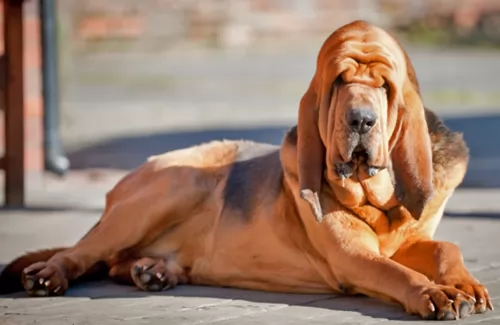 The history of the Bloodhound breed is a fascinating one. Known as a Sleuthhound for its ability to smell out the culprit and bag the prey. Even more so the Bloodhound is known for tracking and finding lost people. He is famous for finding human scents and being able to follow them even days or weeks after the person is lost. They are also able to track people over a great amount of land and have been known to successfully track escaped prisoners or wanted criminals. They are descended from the Saint-Hubert Hounds that were bred at the Abbey/Monastery at Saint-Hubert, Belgium. According to the legends the St. Hubert hounds were bred by the Monks in 1000AD. This hound was thought to be a mixed breed rather than a purebred. That’s because the ancestry of this hound is not really known but it is known that the monks bred them and sent several to the King of France annually. Only black hounds were gifted.
The history of the Bloodhound breed is a fascinating one. Known as a Sleuthhound for its ability to smell out the culprit and bag the prey. Even more so the Bloodhound is known for tracking and finding lost people. He is famous for finding human scents and being able to follow them even days or weeks after the person is lost. They are also able to track people over a great amount of land and have been known to successfully track escaped prisoners or wanted criminals. They are descended from the Saint-Hubert Hounds that were bred at the Abbey/Monastery at Saint-Hubert, Belgium. According to the legends the St. Hubert hounds were bred by the Monks in 1000AD. This hound was thought to be a mixed breed rather than a purebred. That’s because the ancestry of this hound is not really known but it is known that the monks bred them and sent several to the King of France annually. Only black hounds were gifted.
Some kings preferred not to hunt with these hounds thinking them not good enough while others thought the only use for them was as a leash hound. All described the St. Hubert as long in body with short legs. These gifts continued until the French Revolution when hunting in France was greatly reduced until the 19th century. The original St. Hubert strain became extinct in the 19th century and that the current European St. Hubert hound has its origins in the Bloodhound. The Bloodhound as a separate breed was already established in Europe by the middle of the 14th century. They were used as leach hounds to sniff out the prey so that the pack hounds could chase and keep it “at bay”. They were also used from the beginnings of the breed to track humans. At this time they were often known as sleuth hounds. As recorded by John Caius – the authority on Bloodhounds from their origins – writes about the breeds ability to find and track the scent of blood – thus becoming the Bloodhound and its use to track poachers and thieves. He also reported that the Bloodhound and the Sleuth Hound were the same basic breed. The number of Bloodhounds in Britain gradually declined until few remained after World War II. Britain has gradually built their breed back up by importing dogs from America. It was during the 19th century that the Bloodhound was imported into France by breeders who wished to reestablish the St. Hubert Hound. Thus the St. Hubert is both the ancestor and descendent of the Bloodhound. The Britain’s continue to believe that the Bloodhound is a native British breed.
The Bloodhounds in America have had great success as companion animals, with police departments and forest rangers and showing in the prestigious Westminster Kennel Club in New York. There are more Bloodhounds in the United States than anywhere else in the world.
In the end the Anglo-Saxton Bloodhound cannot be specified with any real certainty. Many believe it was not the St. Hubert that the Bloodhound descended from but rather the Norman hound or the sleuth-hound. Many believe it could have included other breeds such as the southern hound, the dun-hound and the Talbot. It cannot be proven today it the Bloodhound’s origins come from Belgian or England.
 Known as the Olympus Dog or even simply as the Greek Shepherd, the Greek Sheepdog is a large to giant molosser dog from Greece. His purpose has always been to guard flocks and livestock from predators and he has been around for hundreds of years, looking much like the Great Pyrenees.
Known as the Olympus Dog or even simply as the Greek Shepherd, the Greek Sheepdog is a large to giant molosser dog from Greece. His purpose has always been to guard flocks and livestock from predators and he has been around for hundreds of years, looking much like the Great Pyrenees.
It is believed that the dog was likely bred with a number of breeds – both local and non-local dogs.
Unfortunately there were no records kept of the development of the breed but today the Greek Sheepdog remains a rare and fairly unknown breed outside of Greece.
It's numbers are dwindling in Greece too and since 1998 the Greek ARCTUROS has made attempts to save the breed, starting the Greek Shepherd Dog Breeding Program.
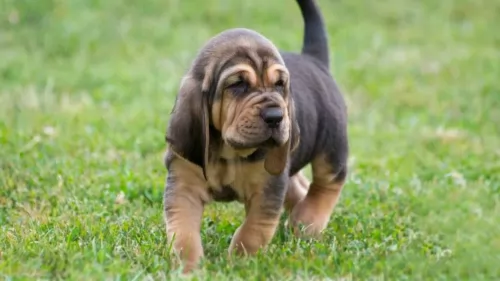 When being judged for confirmation in a show ring, the preference is for a larger dog, with an unusual skeleton in respect to its large size and heavy weight in the bones. They have a narrow head, flat at the sides, but long. They have deep set eyes buried in the deep, long face and wrinkles. The eyes might be yellow or run the gamut to deep hazel depending upon the color of the dog. The long velvety ears and thin and low set on the head. These long ears are as much a part of the Bloodhounds Olfactory system as his amazing nose. They curl backward and inward as the ends. There is a large amount of loose skin on the head and at the jowls. When the Bloodhound lowers his head the loose folds and ridges of skin are prominent on the face and forehead.
When being judged for confirmation in a show ring, the preference is for a larger dog, with an unusual skeleton in respect to its large size and heavy weight in the bones. They have a narrow head, flat at the sides, but long. They have deep set eyes buried in the deep, long face and wrinkles. The eyes might be yellow or run the gamut to deep hazel depending upon the color of the dog. The long velvety ears and thin and low set on the head. These long ears are as much a part of the Bloodhounds Olfactory system as his amazing nose. They curl backward and inward as the ends. There is a large amount of loose skin on the head and at the jowls. When the Bloodhound lowers his head the loose folds and ridges of skin are prominent on the face and forehead.
For many centuries all different colors of Bloodhounds could be found. Today however they are pretty much red, black and tan and black and liver. The Bloodhound is a powerful dog and is larger than most breeds of hounds.
 The Greek Sheepdog is a large dog, standing at 65 – 75cm and weighing roughly between 32 to 50kg. He is a dog that displays physical strength. He has a large head with brown eyes and a serious expression on his face. He has a thick double coat which is essentially white with red, black or brown markings.
The Greek Sheepdog is a large dog, standing at 65 – 75cm and weighing roughly between 32 to 50kg. He is a dog that displays physical strength. He has a large head with brown eyes and a serious expression on his face. He has a thick double coat which is essentially white with red, black or brown markings.
You will also see tri-color dogs. He has floppy ears today but there was a time when the right ear of the male dog was cut off or cropped. The tail is long and bushy and it can be held low but also held up so that it curls over the back.
Maybe because of his size and him being a strong-willed, independent thinker, the Greek Shepherd may not be the best choice for a first time dog owner. Having said that, if you're a strong, firm, patient, kind person, then you'll be able to raise any kind of dog, first time or not.
The Greek Shepherd is a brave, loyal, calm, protective dog and with socialization and training, can make an awesome pet. They are dogs who are a bit suspicious with strangers, not making friends too easily. He loves his human family and wants to be part of their activities. He can't be left on his own day after day as this can lead to excessive barking and destructive behavior.
They've been dogs used to working with livestock and they will certainly need to be taken on daily walks and involved in rough and tumble games as they thrive on activity. The dog won't fit easily into city life where there is just a handkerchief-sized garden as he needs space and activity.
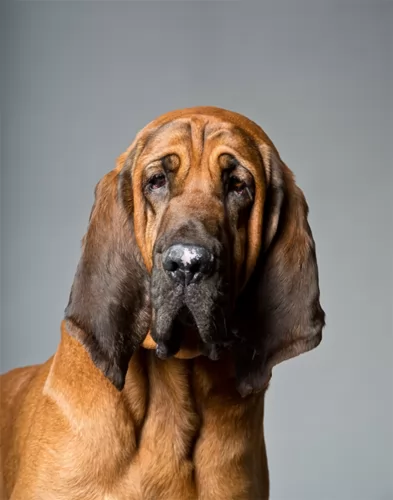 The Bloodhound is known as a gentle soul and he truly is. They are affectionate and gentle with people and children. However, their strong will to track can make them stubborn and hard to handle and train. They are easy going dogs and really like to be with people, children and other dogs. They are affectionate but tend to be set in their ways.
The Bloodhound is known as a gentle soul and he truly is. They are affectionate and gentle with people and children. However, their strong will to track can make them stubborn and hard to handle and train. They are easy going dogs and really like to be with people, children and other dogs. They are affectionate but tend to be set in their ways.
 Your Greek Shepherd is an intelligent, independent dog who likes to show his loyalty and devotion to his owner.
Your Greek Shepherd is an intelligent, independent dog who likes to show his loyalty and devotion to his owner.
He is a protective dog too and when trained and socialized makes an excellent family pet. These Molosser type dogs are formidable dogs known for their bravery and courage.
They're the type of dogs who like a strong leader-type of owner and when he gets someone who he can look up to as his leader, he becomes a loyal, devoted pet.
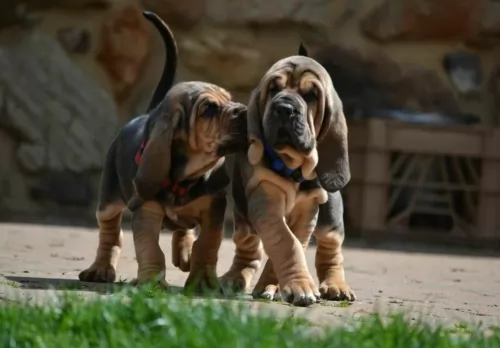 Obviously with ears like the Bloodhound there is always a chance for problems and serious infections. The ears need to be cleaned daily. Because their coat is so thick, they can overheat easily, and they are very prone to bloat, as are many large animals. However, with the Bloodhound, Bloat is the number one killer. Their lifespan is one of the shortest of all dogs at 6.75 years.
Obviously with ears like the Bloodhound there is always a chance for problems and serious infections. The ears need to be cleaned daily. Because their coat is so thick, they can overheat easily, and they are very prone to bloat, as are many large animals. However, with the Bloodhound, Bloat is the number one killer. Their lifespan is one of the shortest of all dogs at 6.75 years.
 With good care and lots of love, this dog can live to be between 10 to 12 years of age. He is unlikely to get sick very often, but still it it wise to know of some of the health issues than can occur with large breed dogs like this.
With good care and lots of love, this dog can live to be between 10 to 12 years of age. He is unlikely to get sick very often, but still it it wise to know of some of the health issues than can occur with large breed dogs like this.
This is a disease of the heart muscle. The heart is enlarged and unable to have the right heart rhythm. The distended muscle isn't able to push the blood through the heart chambers to where it is needed. Cause for this dilated heart can be genetic, nutritional, infectious or metabolic.
Because taurine and carnitine are involved in good heart function, and low levels of these amino acids can cause symptoms of dilated cardiomyopathy, supplementation is useful, especially if you feel your dog isn't getting in the right kind of food.
Borreliosis, a bacterial infection, causes Lyme disease, transmitted by the Ixodes tick. The tick bites the dog and the toxins gets into the dog's bloodstream, with the bacteria travelling to different parts of the body.
Typical symptoms in a dog includes loss of appetite, fever, no energy, swelling of joints and lameness, but symptoms can progress to kidney failure too or cardiac problems. Treatment will include antibiotics.
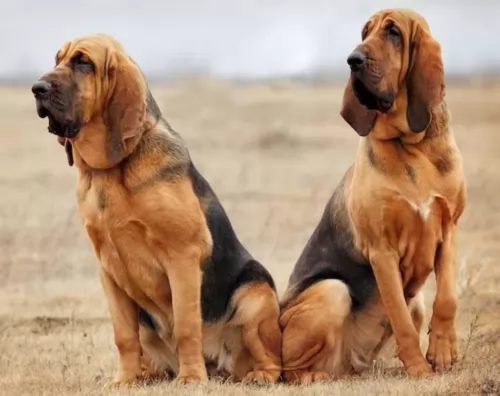 The Bloodhound is not a high energy, fast moving dog but that does not mean he doesn’t have serious nutritional needs. An overweight Bloodhound is on a course to an early demise. They should be fed a high-quality food once a day or split into two daily servings. Do not feed them right before or right after strenuous exercise and remember that strenuous exercise for a Bloodhound is considerably less than it is for a terrier.
The Bloodhound is not a high energy, fast moving dog but that does not mean he doesn’t have serious nutritional needs. An overweight Bloodhound is on a course to an early demise. They should be fed a high-quality food once a day or split into two daily servings. Do not feed them right before or right after strenuous exercise and remember that strenuous exercise for a Bloodhound is considerably less than it is for a terrier.
As previously mentioned the number one cause of death in Bloodhounds is Bloat. They are also prone to cancer. They have minor issues with their eyes, but their ears and skin are also major concerns. Clean the ears daily and wipe out the skin folds and wrinkles to prevent infections. They should be test for hip and elbow dysplasia simply because they are large dogs, though these conditions are less common in Bloodhounds.
Though the Bloodhound is known as a couch potato his stamina and activity levels are usually greatly underestimated. He can follow a scent for 7-10 hours over miles of terrain with out a problem. He needs daily exercise such as long walks on a leash. Do not take your Bloodhound out off leash because if he picks up a scent and wanders off you will not be able to get his attention to call him back.
 The coat of the Greek Shepherd is fairly long so it will need to be brushed at least twice a week to keep it free from matting and tangling. He is an average shedder and the brushing will remove all loose hairs, keeping the coat sleek and shiny.
The coat of the Greek Shepherd is fairly long so it will need to be brushed at least twice a week to keep it free from matting and tangling. He is an average shedder and the brushing will remove all loose hairs, keeping the coat sleek and shiny.
Feeding your Greek Sheepdog requires giving him top quality food as this will ensure he is healthy and can ward off common dog illnesses. If you're going to be feeding him kibble, make sure to go for the top quality brands, and as a treat for your pet you can add in some brown rice, pasta, brown bread, cooked chicken and vegetables.
Dogs are essentially carnivores and he will need to have some raw meat such as beef added into his kibble from time to time. He should never ever be without a constant supply of fresh, cool water.